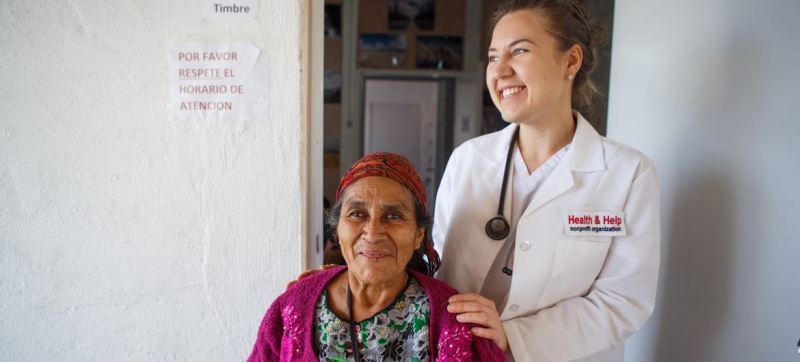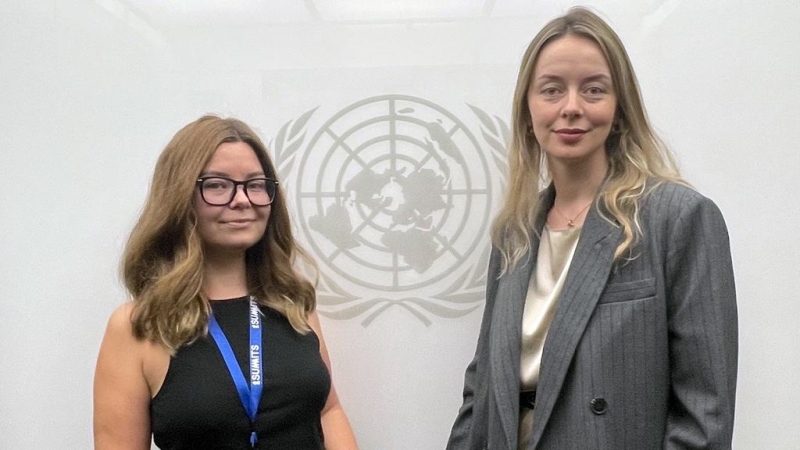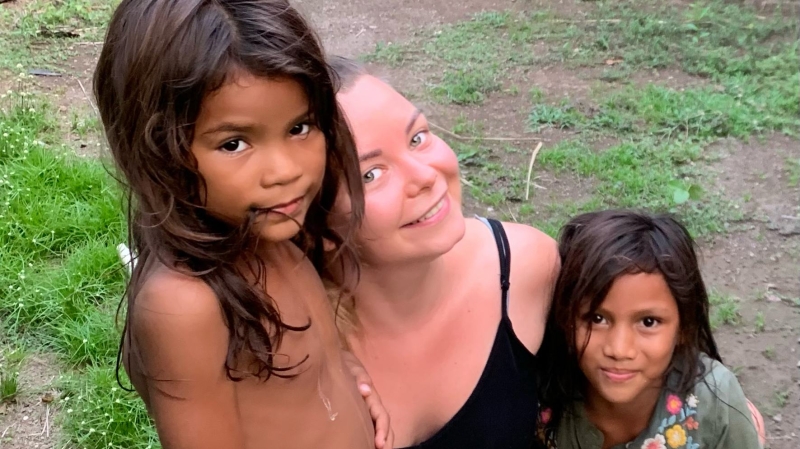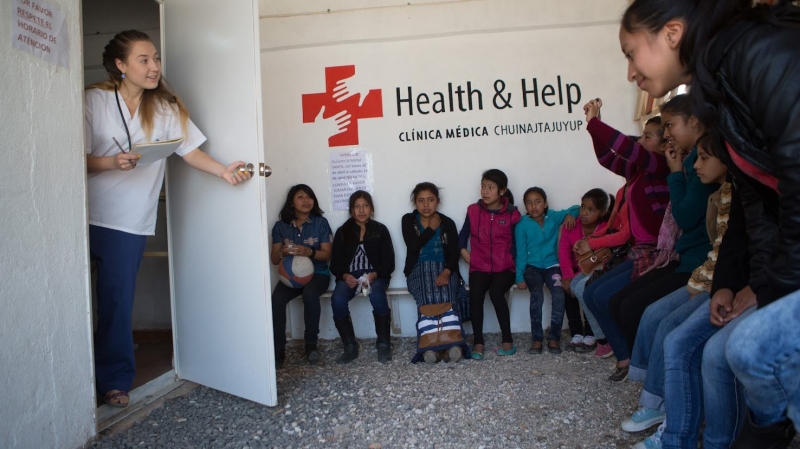
Victoria Valikova, co-founder and director of Health & Help, at a clinic in Guatemala. INTERVIEW | How an International Team Empowers Rural Communities in Nicaragua and Guatemala Health
In September, not only heads of state and high-ranking officials come to the UN headquarters in New York, but also representatives of many non-profit organizations (NPOs) that work around the world to support the Sustainable Development Goals. This year, among them are Ekaterina Stukonog and Ekaterina Korneeva from the humanitarian project Health & Help.
The NGO has built two clinics and has helped tens of thousands of people in Guatemala and Nicaragua. Health & Help volunteers and staff provide patients with advice and life-saving medications, including for people with chronic diseases.
The organization spoke to Evgeniya Kleshcheva of the UN News Service about its mission and how global action and collaboration can help bring health care to hard-to-reach areas of the world.
EU: Health &Help’s global mission is to provide access to essential health care where it is most needed, for everyone, regardless of geography or economic means. We sincerely believe that human life has the same value anywhere in the world.

Health & Help Fundraising Director Help Ekaterina Stukonog (left) and corporate partnerships manager Ekaterina Korneeva.
We help people where access to basic health care is difficult or impossible – in remote areas of Guatemala and Nicaragua – and we do this through volunteers and donors. Our work directly supports SDG 3, “Good Health and Well-Being.” Basic access to health care and medicines impacts not only the health and well-being of an individual, but also the well-being and prosperity of a community as a whole, both socially and economically.
UN News Service: Why did you decide to attend the UN Future Summit and what were your expectations?
EK: I saw this opportunity online while I was monitoring what opportunities we might have. This is the first forum of its kind for us. We took part in both the Days of Action and the Future Summit itself.
And we expect to get to know partners who are interested in our work in Nicaragua and Guatemala better and to build strong relationships that will improve the lives of patients in the villages where we work. We are interested in both corporate partnerships and partnerships with UN agencies or other NGOs. And so far, I would even say, our expectations exceed what we originally had in mind.
UN News Service: Tell us where you participated, do you have any impressions already?
EK: I can tell you about the side events of the Days of Action and the summit itself. We didn’t notice them right away, but when we saw them, we realized that this was a great opportunity for networking. We participated in an event organized by Plan International, and this also gave us a unique opportunity to meet representatives of the Guatemalan government, who also participated and spoke about supporting women and adolescents.
Women and children are one of the focus groups for our clinics and we hope to be able to do some kind of joint program because we not only provide medical care but also educate the population on family planning and health issues.
UN News Service: What are your plans or hopes for the future and how can such events help?
EU: Actually, for a small organization like ours, the opportunities to participate in global events like this summit and the General Assembly are opportunities to expand networks, to find new strategic partnerships. And we really have something to say. We are the voice of communities in hard to reach areas of Guatemala and Nicaragua.

Ekaterina Stukonog with patients of the clinic in Nicaragua.
For these people, our clinics are the only opportunity to receive basic medical care. And we are also happy to share our unique experience in building clinics in hard-to-reach regions. And we very much hope, including within the framework of the opportunities given to us, thanks also to the UN, to find, in fact, strategic partnerships for expanding the network of our clinics, also in other Central American countries.
In addition, we are certainly very happy to be part of the ecosystem of the global community, where everyone contributes in their own way to achieving the Sustainable Development Goals.
UN News Service: What message did you come here with to the international community??
EK: We were preparing a message when we applied to participate in the Days of Action. One of the interactive dialogues discusses how global governments can influence the current agenda, and we are looking at this primarily from the point of view of health. That is why we said the word “partnership” so many times. One of the ideas was to develop private partnerships with UN agencies.
This would help us in various ways, from building roads to our clinics, to providing them with supplies. And also looking at the experience of organizations like ours. It seems to me that despite the fact that we are a small organization, we have quite a lot of experience, since we were able to build two medical institutions from scratch.
And perhaps by distributing some resources to providing medical care through NGOs like us, Health & Help, we can save more human lives.
EU: For us, this is a contribution to creating a new world where everyone has the right to access basic health care regardless of where they were born or where they live. We believe in this. And we are confident that the goals of the UN and our joint activities with other organizations, with representatives of non-governmental organizations, with delegates, with various UN structures, all this together will help us to really achieve these goals and be able to make this world a more pleasant place.
UN News Service: Tell us a little more about the experience of Health & Help.
EU: We have two clinics where we provide basic health care. They are located in hard-to-reach regions of Guatemala and Nicaragua. In Guatemala, our clinic is located in a village called Chuinahtahuyup. Modern descendants of the Maya Indians live in this mountainous and hard-to-reach area. In Nicaragua, our clinic is located literally in the jungle, in a very, let’s say, hard-to-reach place, in the village of Las Salvias, on the shore of the Gulf of Fonseca. And there live about five thousand people in very difficult conditions, without electricity, access to clean drinking water and any logistical accessibility.

Victoria Valikova, co-founder and director of Health & Help, at a clinic in Guatemala.
And it is very important for us to create opportunities and confidence in the future for these people, for future generations, in terms of providing access to basic medical care. In both regions, we are the only medical institution that, in principle, provides any medical care. And we do this thanks to the efforts of many caring people, our volunteers and philanthropists from different parts of the planet.
People come to us from literally all continents, with the exception of Antarctica, perhaps. Our team is as international as possible and we all believe that people should not die from curable diseases and everyone contributes in their own way.
EK: I would add about local communities that during the construction of the clinics, the local population also helped us. It was important that local residents understood the importance of the clinic, and that they themselves participated. Plus, we also have local nurses working for us, and when necessary, we conduct not only educational programs, as I said, on sexual education, family planning, and so on, birth control, but we also train nurses and help them in some cases to be more literate or to provide medical services more easily and simply.
Therefore, it seems to me that our mission is not only treatment or providing medical care, but also education. Ekaterina has already noted drinking water. If we talk about the UN goals that we support, then in one of the clinics we can also provide clean drinking water, taking into account the water purification system that we have installed there.
EC: And I would also probably like to add that in our team we see a certain injustice in this world, but we do not look for the guilty, but look for solutions to certain problems. And in our team at Help & Help there are people, including on a voluntary basis, who do not want to stand aside and, in fact, themselves are the solution to global problems. And as I said, even though we are such a small organization, it is really important for us to be part of such a global movement for sustainable development.
And again, thank you very much for giving us such a wonderful opportunity from the UN.
Read also:
